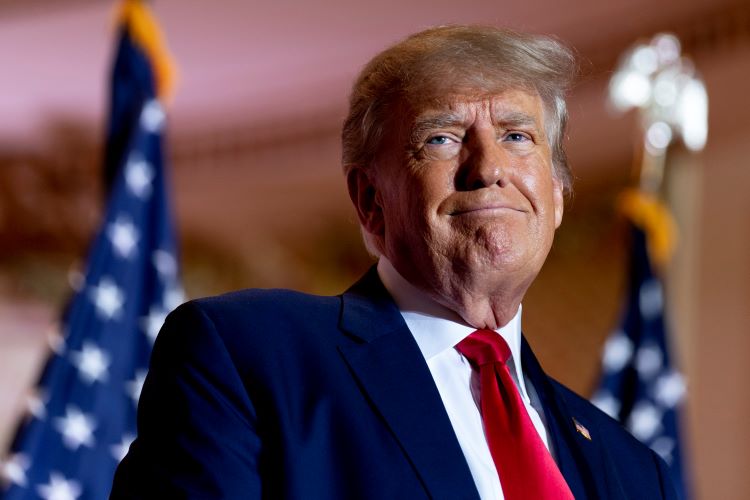Could Trump pardon himself? DOJ considered self-pardons in Nixon era

Former President Donald Trump in Palm Beach, Florida, in November 2022. “The idea of a self-pardon runs counter to the entire purpose of a pardon under the Constitution,” said Ken Gormley, the president of Duquesne University and an expert on pardon power. Photo by Andrew Harnik/The Associated Press.
If former President Donald Trump is convicted on federal charges and then wins reelection, would he have the power to pardon himself?
Two legal academics answered the question in the negative when consulted by the Washington Post. The U.S. Department of Justice’s Office of Legal Counsel had the same reaction in 1974 when then-President Richard Nixon sought advice on the issue—but it offered another pardon route.
Article II, Section 2 of the U.S. Constitution says a president “shall have the power to grant reprieves and pardons for offenses against the United States, except in cases of impeachment.”
No president has ever pardoned themself, and no court has resolved the issue. But it’s clear that presidents can’t pardon state crimes, CBS News points out. And the pardons must be for acts already committed, according to an 1866 U.S. Supreme Court decision cited by CBS News.
According to Michael Gerhardt, a professor at the University of North Carolina School of Law, the constitutional provision talks about granting a pardon, and when you grant something, you give it to someone else. The only sensible reading is that Trump couldn’t pardon himself, Gerhardt told the Washington Post.
Ken Gormley, the president of Duquesne University and an expert on pardon power, agreed.
“The idea of a self-pardon runs counter to the entire purpose of a pardon under the Constitution,” Gormley told the Washington Post.
Former Acting Assistant Attorney General Mary C. Lawton also concluded that presidents can’t pardon themselves in her August 1974 decision for the DOJ’s Office of Legal Counsel.
“Under the fundamental rule that no one may be a judge in his own case, the president cannot pardon himself,” the legal opinion said.
But if a president declared themself temporarily unable to perform the duties of their office under the 25th Amendment, the opinion said, the vice president would become acting president and could pardon the president.
“Thereafter the president could either resign or resume the duties of his office,” according to the opinion.
Some experts differ in their reading of the pardon power. Mark Tushnet, a professor emeritus at Harvard Law School, told CBS News the issue is debatable.
“The arguments about whether a president can pardon himself are not only unsettled in the sense that they haven’t come up before, but they’re also unsettled in the sense that reasonable lawyers could look at the materials and say either result is legally defensible,” Tushnet said.
It could be difficult to challenge a president’s self-pardon, however, because standing issues could prevent the case from going forward.
Challengers would have to show that they were harmed by the self-pardon, and “it’s really hard to see who in particular would be harmed by it,” Tushnet told CBS News.
Write a letter to the editor, share a story tip or update, or report an error.



